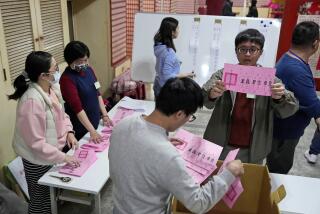Nurture Seeds of Democracy in China
- Share via
For many Americans, any dreams of democracy in China were crushed in Tiananmen Square in 1989. But an encouraging democratic revolution continues to take place in that country.
Since the late 1980s, China has been experimenting with democratic elections at the village level. Monitored and advised by Americans, these elections often pit Communist Party candidates against nonparty opponents. Currently, more than half of the leaders in China’s 740,000 village committees are directly elected. And early this year, without approval from higher level authorities, local officials in Suining, Sichuan province, initiated the first direct election for a township chief. The significance of this event should not be underestimated.
China’s 44,700 town and township governments are the the lowest layer of governance under the state budget. Officials are full-time state employees. Law dictates town and township chiefs must be indirectly elected by the party-controlled local People’s Congresses. Thus, the election in Suining was a daring move. Official reaction in Beijing was interestingly ambiguous, calling the election illegal but praising the “democratic awareness” by local people. On Feb. 26, the party-controlled China Central TV network broadcasted an extended news report praising the initiatives of the local leaders.
Beijing knows that direct, democratic elections can reduce tension between peasants and local governments and provide social and political stability in rural China. They also give the government more legitimacy in the eyes of the people.
But what about national democratic elections? When asked by foreign journalists, President Jiang Zemin and Premier Zhu Rongji agreed that China would have national elections someday, but argued that democratization should proceed slowly.
Contrary to Mao Tse-tung, whose direct mass campaigns destroyed the political establishment, today’s leaders have an elitist and institutional view of democracy. They believe democracy requires the rule of law and the development of political institutions and procedures such as elections. They also believe that socioeconomic development is the precondition for democracy. One problem, according to this view, is the lack of education among peasants. “They can’t even read. How can you expect them to fill out the ballot?” This is a common complaint of Chinese political elites.
By postponing a general election, Chinese leaders are missing an opportunity. No other political parties in China can compete effectively with the Communist Party, under whose rule the standard of living has improved rapidly in the past 20 years. The party’s strength probably would come from the countryside, where 70% of the people live, people who benefited tremendously during market reform. Rural China always has been the Communist Party’s power base.
City folks are “too” educated to fully support the Communist Party. Once the peasants become more educated, they too would be less inclined to support the party without question. Therefore, the sooner the general election, the more likely the Communists would win.
Chinese leaders worry about being voted out of office as happened in other socialist states, such as the Soviet Union and Eastern European countries. But an incumbent party can launch a democratic transition without losing control over the government. In Taiwan, democratic transition began in 1986, yet the incumbent party has stayed in power.
How might the United States hasten the democratization of China? One approach could be to support political dissidents in and outside China. The Chinese government seems to be willing to let go of even the most famous political dissidents, such as Wei Jingsheng and Wang Dan. But once abroad, dissidents lose their influence and appeal in China.
Perhaps the U.S. can continue to chastise the Chinese on the world stage for its poor record on human rights. But that only seems to make the Chinese more rigid in their stance.
A more effective approach is to help China build its democratic institutions and legal framework, and teach people how to run campaigns and how to vote. In recent years, the Republican National Institute and the Carter Center sent delegations to China as monitors and advisors for local elections. Exchanges between legal scholars and officials also are underway since the mutual visits of Presidents Jiang and Clinton. This work-within-the-system approach will promote more stable and long lasting democratic values, practices and institutions in China.
More to Read
Sign up for Essential California
The most important California stories and recommendations in your inbox every morning.
You may occasionally receive promotional content from the Los Angeles Times.













